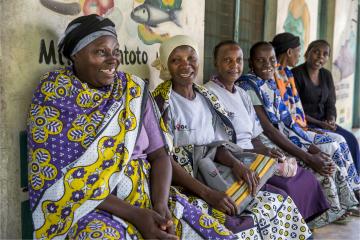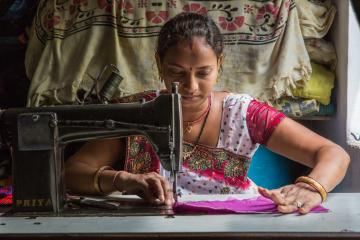
Gender norms and women's work: Reflecting on current evidence and policy opportunities

As the world continues to grapple with the impacts of Covid-19, policy and research conversations on enhancing gender equality and women’s economic empowerment have also gained momentum. While the challenges women face in entering and remaining in the labor market are not new, they have worsened in the wake of the pandemic. Even those who remain in the labor market face greater challenges achieving their full potential compared to men.
One of the barriers to women’s economic empowerment and labor market participation is restrictive gender norms relating to the acceptability of women working outside the home and the division of care and domestic work responsibilities inside the home. Consequently, researchers are seeking answers on how to address these challenges and ensure women’s economic empowerment globally.
To help policymakers effectively address these challenges, the J-PAL Gender and Economic Agency (GEA) Initiative and the International Development Research Centre (IDRC) Growth and Economic Opportunities for Women (GrOW) East Africa hosted a webinar earlier this summer to discuss research on gender norms and attitudes relating to women’s work and economic empowerment globally.
There is limited evidence on strategies to effectively challenge and change attitudes and norms on women’s labor force participation, a key reason why both the GEA and GrOW initiatives have made this a core theme in their research portfolios. But as the evidence base on gender norms grows, it is essential to share emerging insights with decision-makers on what works to address and challenge restrictive norms and attitudes on unpaid care and domestic work, along with norms and beliefs about women working outside the home.
Addressing the burden of unpaid care and domestic work
Unpaid care and domestic work is a pressing challenge locking women out of the labor force and minimizing the economic potential of those already in the labor force. But gender norms result in women often sharing a disproportionate burden of this unpaid work.
At the event, Grace Bantebya shared preliminary findings from an ongoing study, funded by IDRC and in partnership with Makerere University School of Women and Gender Studies, showing that both men and women believed equally that household work is for women. Further, men and women almost equally felt that men should be shamed for doing certain kinds of unpaid care work. Meanwhile, women who don’t participate in unpaid care work face repercussions, including gender-based violence and shame.
Likewise former J-PAL Policy and Research Advisor Joy Kiiru found that in Kenya, while norms are not homogenous across cultures and age, some women are worried about the consequences of men doing domestic work. To shift these norms, “reference groups,” influential actors such as elders, community leaders, husbands, and parents, are a key mechanism for positive change. (These results are not yet published.)
In Rwanda, which has been quite progressive in promoting gender equality, Dickson Malunda shared preliminary findings in his IDRC-funded study on unpaid care work, suggesting that women’s economic empowerment remains largely constrained by unequal distribution of such work. Men are more likely to work for a wage compared to women, who spend considerably more time on domestic chores.
To challenge and mitigate these norms, policymakers should look to the results of Dickson’s and Grace’s ongoing evaluations.
Dickson’s study on unpaid care work is assessing whether a holistic participatory program can reduce and redistribute this work among women in Rwanda. Grace is testing the impact of the “POWER model,” a multidimensional program which aims to shift gender norms associated with unpaid care work. The “POWER model” comprises five areas: women’s empowerment; engaging men and boys; community dialogue, activism and action; local level duty bearers and service providers; and reaching and influencing decision makers.
The growing evidence base on effective strategies to address unpaid care and domestic work will be invaluable to policymakers who are keen on addressing this disproportionate burden on women.
Understanding beliefs about women working outside the home
Beyond unpaid care and domestic work, gender norms related to the acceptability of women working outside the home can restrict women’s economic opportunities and empowerment.
Alessandra L. González discussed her and co-authors’ study in Saudi Arabia on misperceived norms on women working outside the home. In Saudi Arabia, male guardianship of their wives is a longstanding custom, and consequently, men’s perspectives on whether women should work outside the home greatly influence women’s labor force participation. Researchers evaluated whether information changed behavior regarding norms among over 500 married men.
The study found that participants underestimated peer support for women’s work outside the home. When researchers shared information that there was actually greater support for women’s work outside of the home than anticipated, men were more likely to sign their wives up for a job matching platform and for driving lessons. Their wives were also more likely to apply for a job.
In a follow-up study, researchers found that women were more likely to pursue a job when given this same information. A key insight from this study is that while social norms play a key role in constraining female labor force participation, providing simple information may shift perceptions favorably.
Also at the event, J-PAL affiliated professor Rebecca Dizon-Ross presented an ongoing replication and adaptation of the Saudi Arabia study in India. This new study, funded by GEA, explores how contextual differences may be useful for new knowledge. For instance, in India labor force participation is lower than in Saudi Arabia, and the caste system plays a significant role as it influences whose beliefs matter. Researchers will measure people’s beliefs, as well as their beliefs about others’ beliefs, about women’s labor force participation.
Similar to the Saudi Arabia study, researchers will later deliver information to men about what other men truly believe in regards to women working outside of the home; they will then measure whether this information impacts women’s labor market participation. The replication and adaptation of this study in a new context will provide valuable information about misperceptions and gender norms.
Opportunities for evidence to inform policy decisions
A key goal for both GEA and GrOW is establishing and maintaining close relationships with policymakers who are key users of the study results. As part of the webinar, policymakers from Kenya and Uganda discussed how their respective governments are considering challenges around norms and attitudes on women’s economic empowerment, and efforts towards key policy decisions are already in motion.
In Kenya, for example, Florence Chemutai, Deputy Director of the Socioeconomic Empowerment Directorate at the State Department for Gender (situated within the Ministry of Public Service, Gender, Senior Citizens and Special Programmes) spoke about the forthcoming National Policy on Women’s Economic Empowerment. This policy will address gender norms and attitudes that hinder women’s economic empowerment, among other challenges. The State Department for Gender is also developing a new policy specifically focused on unpaid care and domestic work.
Similarly, Angela Nakafeero, the Commissioner, Gender and Women Affairs at the Uganda Ministry of Gender, Labor and Social Development, spoke about the Uganda Women’s Entrepreneurship Program (UWEP) as a key initiative that will benefit from the research insights presented.
Angela also highlighted the Succession Law, where some of the attitudes relating to women’s entitlement to property are being challenged. This is an area in which the Ministry is seeking more evidence to ensure this law is adequately reviewed. She further pointed that, presently, Uganda’s program implementation action plans have not adequately ensured barriers to women’s economic empowerment are addressed, a gap J-PAL and other research institutions could help fill.
Scaling effective approaches
In India, J-PAL South Asia has collaborated with the Government of Punjab on integrating an adolescent gender sensitization curriculum, designed by the NGO Breakthrough, into the syllabus for all 4500 government schools in Punjab. In a randomized evaluation conducted between 2014–2016 in 314 government schools in Haryana, India, researchers found that the curriculum shifted the gender attitudes and behaviors of both boys and girls, and also led to students enacting more gender-equitable behavior.
At the event, Anna Rego, a senior policy manager at J-PAL South Asia, emphasized the value of J-PAL’s longstanding institutional partnership with the Government of Punjab in driving the success of the Breakthrough partnership. Based on this engagement, one of the open research questions for the J-PAL South Asia team is understanding what high-impact programs can be directed at men to shift attitudes regarding women’s economic empowerment.
As policymakers continue to confront the myriad barriers to women’s economic empowerment, understanding and addressing restrictive gender norms and attitudes, as well as tackling the disproportionate burden of unpaid care and domestic work will be critical. Emerging research findings provide helpful insights to tackle these challenges.
However, more research is needed to support policymakers to enact evidence-informed policies to counter these challenges. For instance, understanding the effectiveness of interventions as well as mechanisms for impact are especially useful in ensuring women enter the labor force and achieve their full potential. The nature of funding models for these investments is also a critical consideration with governments facing competing priorities and limited funding for development initiatives.
GEA is seeking forward-looking funding partners to enable robust, policy-relevant research and unlock scaling opportunities. To learn more about J-PAL’s Gender and Economic Agency (GEA) Initiative and explore opportunities for collaboration, visit the GEA page or email us.
Related Content

Addressing inequalities in women’s work: J-PAL launches Gender and Economic Agency Initiative

Gender and Economic Agency Initiative increases funding to Latin America and South Asia with third funding round

